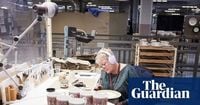Wedgwood, the renowned ceramics manufacturer with roots stretching back to 1759, is set to pause production at its Barlaston factory in Staffordshire for up to 90 days beginning September 29, 2025. The announcement, made on September 16, 2025 by Wedgwood’s parent company Fiskars Group, will see approximately 70 employees placed on temporary leave, though they will continue to receive their full salaries throughout the shutdown. The company also confirmed that factory tours, a popular feature of the World of Wedgwood tourist attraction, will be suspended until early January 2026.
The decision comes as a response to a challenging market environment marked by a noticeable drop in consumer demand and elevated inventory levels in some of Wedgwood’s key markets. Sjoerd Leeflang, Senior Vice President at Fiskars Group, explained the rationale, stating, “There is a global instability in terms of what the demand is for our products made in England versus what we have already in the inventory. If we were to continue production we would be producing too much stock for the various markets where we sell.” He emphasized the company’s commitment to its workforce and heritage: “Our employees are extremely important—we will take care of them, we will pay their full salary for the rest of the period and we will welcome them back at the beginning of January.”
Wedgwood’s Barlaston factory is famed for producing high-end and bespoke ceramics, including handcrafted pieces in fine bone china and the company’s signature Jasperware. The techniques used by its skilled artisans are rooted in the traditions established by Josiah Wedgwood, the company’s founder, who was born in Burslem, Staffordshire in 1730. According to a spokesperson for Fiskars Group, “This living tradition reflects our commitment to craftsmanship, the value of Made in England, and Barlaston’s enduring role in our heritage and operations.”
The temporary production halt is described by Fiskars as a “short-term measure” intended to address the mismatch between inventory and demand. “This short-term measure is being taken to address elevated inventory levels caused by lower consumer demand in some of our key markets,” the company said. While the pause is not expected to extend beyond 90 days, the company has not ruled out the possibility of further adjustments should market conditions fail to improve.
This move comes at a difficult time for both Wedgwood and the broader ceramics sector in the UK. The industry has been battered by rising costs, particularly in energy, and a series of notable closures. In February 2025, the nearly 200-year-old Royal Stafford collapsed, and Moorcroft ceased trading before being rescued by new ownership. Additionally, Villeroy & Boch Group recently announced plans to close one of two tunnel kilns at its Armitage Shanks site in Rugeley, potentially affecting up to 100 employees. According to BBC, these developments underscore the pressures facing traditional British ceramics makers, who must contend with both global economic headwinds and shifting consumer preferences.
Financial results from Fiskars Group highlight the tough environment. The company’s half-year financial report for January to June 2025 showed a 2.5% decline in net sales compared to the same period in 2024, with a sharper 6.8% drop in the April to June quarter. Fiskars projects its comparable earnings before interest and taxes (EBIT) for the full year 2025 to be between €90 million and €110 million, down from €111.4 million in 2024. The company noted that the second half of the financial year, especially the fourth quarter, is crucial due to the holiday season, and any further disruptions could have a significant impact on full-year performance.
Local leaders have voiced their concern about the pause and its implications for the region. Gareth Snell, MP for Stoke-on-Trent Central, reflected on the significance of the Wedgwood brand, saying, “The name 'Wedgwood' has been famously linked to Stoke-on-Trent since 1759. It's had its ups and downs over the last 266 years. The news that manufacturing will be paused at the Barlaston site in September and factory tours will be cancelled is incredibly worrying and further highlights the immediate need for greater support for British Ceramics.” He added, “The support cannot be in some distant future; or the promise of help tomorrow, but real help today. Ministers know what we need, and I had already started speaking to the new Secretary of State for Business & Trade about the work I and other MPs had been doing alongside the GMB and Ceramics UK to support the industry.”
Snell also highlighted the broader cultural and economic importance of Wedgwood to the region: “The world of Wedgwood is also more than a factory. It tells the story of our heritage, our craftsmanship and our skill. It is a tourist destination that brings thousands of people to North Staffordshire every year. I understand that the V&A’s Wedgwood Collection will still be open and available during this time as will the other visitor attractions on site. My thoughts are with the workers who now face an uncertain future. I’ll do whatever I can to support constituents affected by today’s news and support the company through this difficult time.”
For the workers themselves, the news is a mixed blessing. Colin Griffiths, GMB Senior Organiser, acknowledged the challenges but sought to reassure staff: “Wedgwood ceramics are the envy of the world. With a 300 year history of British manufacturing at Wedgwood, we’re proud that highly skilled GMB members are at the heart of this British icon. The ceramics industry is one where there are frequently seasonal variations. Workers are on full-pay and both Wedgwood (Fiskars) and our union are supporting staff during this time.”
Meanwhile, Stoke-on-Trent City Council is ramping up its efforts to support the local ceramics industry by signing a pledge to "buy local". Jane Ashworth, leader of the city council, urged others to follow suit: “We are proud to sign up to this pledge and urge other organisations—and individuals—to do the same. Stoke-on-Trent is famous across the globe for the quality of our ceramics. By buying local, we aren't just supporting local businesses—we are also getting the best of the best. Buying local doesn't have to mean spending more—but it does mean we are keeping money in Stoke-on-Trent and supporting local businesses, and local jobs.”
Despite the current uncertainty, Fiskars Group remains optimistic about the long-term prospects for Wedgwood. Leeflang, the Senior Vice President, reassured stakeholders, “Trust Wedgwood, trust the owner of Wedgwood, Fiskars Group, we are here for the long term, we do this to look after a healthy future for the Wedgwood brand.” He stressed the importance of maintaining the brand’s tradition of craftsmanship and its commitment to producing in England, even in the face of global economic volatility.
As the world waits to see how the market will evolve in the coming months, the story of Wedgwood’s pause is a poignant reminder of the delicate balance between tradition and adaptation in a rapidly changing economy. For the people of Staffordshire and ceramics enthusiasts everywhere, the hope is that this iconic brand’s pause will indeed be short-lived, allowing its artisans to continue shaping clay—and history—for generations to come.






